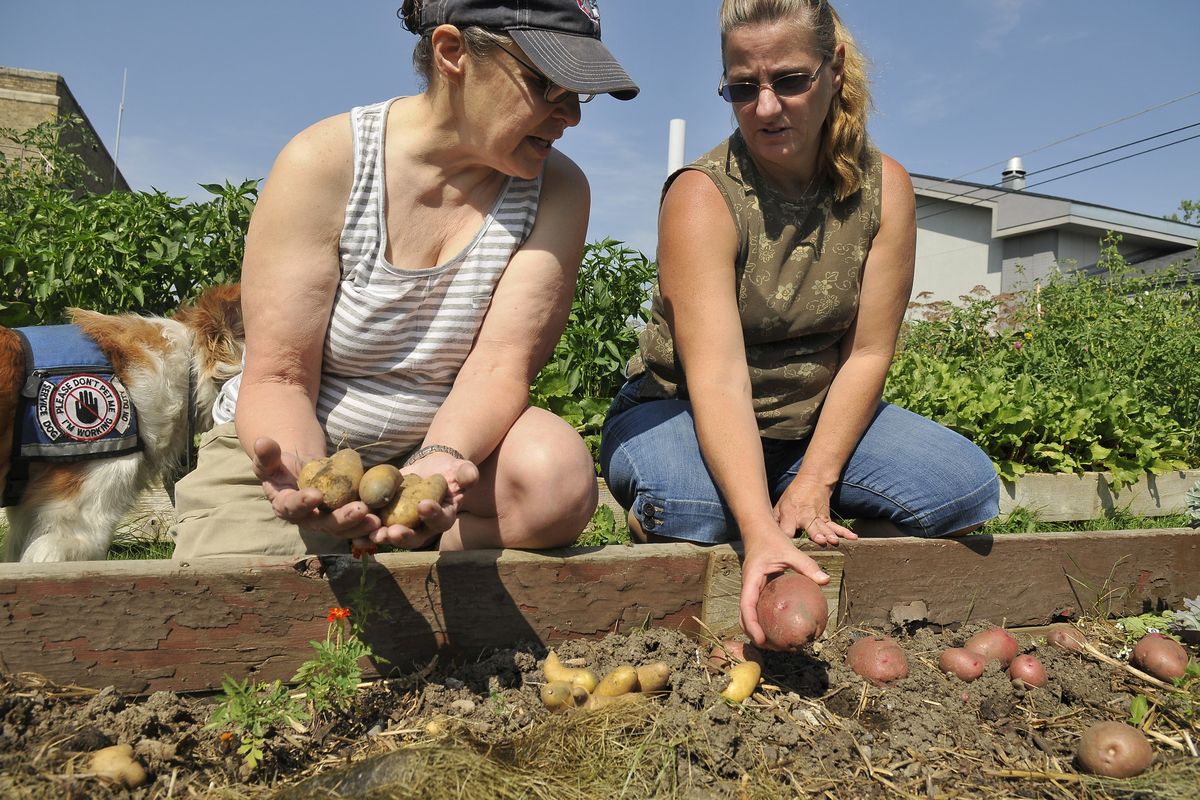Pump House garden helps bring Hillyard community together

There’s one thing they know for certain at Hillyard’s Pump House Community Garden: They will not run out of water. The garden is located on the Spokane Water Department property, right next to the pump that’s responsible for delivering water to a big part of northeast Spokane.
“The water department actually gives us the water for free,” said Donna Fagan, Pump House Community Garden president. “And they were gracious to put in the spigots for watering, promising they’d add more as the garden grows.”
The pump house garden produced its first crop in 2008. It was one of the gardens that got funding from a nutrition program managed by the Spokane Regional Health District, and the Water Department embraced the idea as a way of cutting back on maintenance around the pump house.
“Since we are here, right next to the water source, we can’t use chemicals or anything that may hurt the water supply,” Fagan said. Judging by this year’s tomato and potato crop, going without chemicals is just fine as the 24 raised beds are bursting at the corners. Most community gardens are grown without chemicals.
Fagan said about 10 families, many of them apartment dwellers, have beds at the garden.
“Some of them live in the Regal Apartments, and they’ve organized it so they take turns watering,” said Fagan, who’s married to Spokane City Councilman Mike Fagan. She became involved with the garden at its inception because she was on the Hillyard Steering Committee and on the Bemiss Neighborhood Council.
“I think I was the only one there who knew anything about gardening,” she said, laughing.
Christy Gerhardt is the garden’s manager and she’s been involved since last year.
Gerhardt said she got started at the garden after she moved from a horse farm to an apartment and missed gardening. She’s taken composting classes provided by Spokane Regional Solid Waste System and will be a master composter once she’s finished 40 hours of volunteer and outreach work about composting.
“I’m pretty sure she’s done with that by now, as much as she’s helped us,” Fagan said.
Gerhardt is helping everyone in the garden compost appropriately and said the classes she took were the most fun she’d had in a long time.
“You just learn so much,” she said, explaining that some of the most common composting mistakes made are trying to compost garden waste that hasn’t been cut into small enough pieces.
“Even leaves have to be shredded or they’ll mat and the process won’t work,” Gerhardt said. “Compost also has to be aerated, and it has to have moisture to turn out well.” Not recommended as compost material are grease, dairy, diseased plants and animal waste because of potential disease agents.
“But it’s not hard; you can get the hang of it,” said Gerhardt, who has two beds at the pump house and two other beds at the ECCO Garden in the East Central Neighborhood.
Watch Pia Hallenberg talk with KHQ about this story
Fagan has raised beds in the garden at her home but said having a home garden won’t preclude someone from gardening at the pump house.
“Some people come here because their own gardens are too shady or too small,” Fagan said.
Both women said they would love to see more front lawns turned into vegetable gardens.
“That just makes so much sense,” said Fagan.
The original plan was for the garden to grow by six beds every season. The oldest beds need to be refurbished or replaced, Fagan said, because they were built out of recycled wood and are beginning to fall apart.
“And we would like to have some handicap accessible beds,” Fagan said, explaining that would require a bit more construction and also reconfiguration of the garden to make it easier for wheelchairs.
It’s $20 for a full raised bed for one growing season. Those funds go to paying for fencing, mulch and materials to build more beds.
This season, Fagan said they hope to add a shed to the garden.
“A neighbor down the street comes up and mows the grass for us,” Fagan said. “If we had a shed we could keep our tools here.”
This year there are plans for a harvest party. Gerhardt said she’s noticed people really like growing things, but not always harvesting.
“I don’t know why that is,” she said, “but a harvest party may help that.”
Fagan said leftover vegetables could be donated to the food bank at the North East Community Center, which is also a stakeholder in the garden by handling all the finances.
Both women said the garden is thriving and growing at just the right pace, one bed at a time.
“We just love it here,” Gerhardt said.